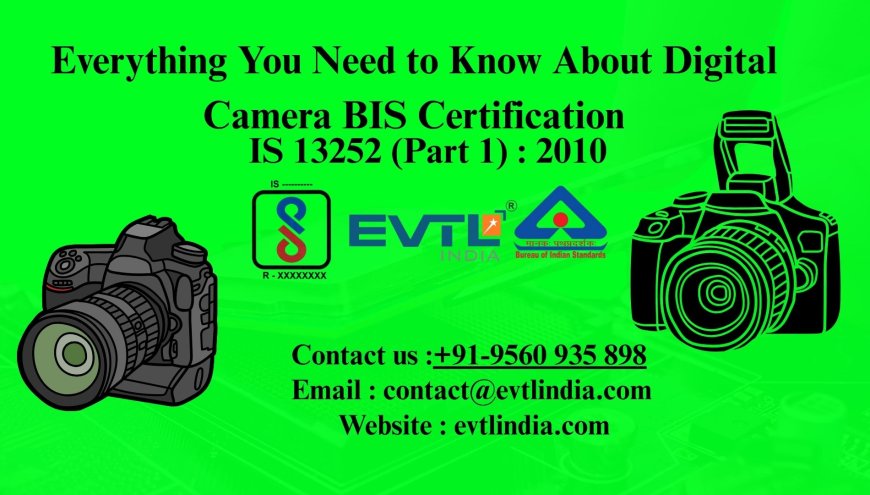Everything You Need to Know About Digital Camera BIS Certification
Learn the complete process of Digital Camera BIS Certification in India, including BIS CRS requirements, IS 13252 (Part 1): 2010 standards, import rules, and compliance steps to ensure smooth market entry.

With the rising demand for high-performance digital cameras in India, both global manufacturers and importers must ensure compliance with Indian regulatory standards.BIS CERTIFICATION FOR DIGITAL CAMERAOne of the most critical certifications required for selling or importing digital cameras into the Indian market is the BIS Certification for Digital Camera. This mandatory certification falls under the Compulsory Registration Scheme (CRS) of the Bureau of Indian Standards (BIS). In this article, well explore the certification process, technical standards, legal requirements, and key information regarding the BIS CRS for Digital Camera under IS 13252 (Part 1) : 2010, which governs the safety standards for electronic products in India.
Understanding BIS and Its Role\
TheBureau of Indian Standards (BIS)is the national standards body of India, functioning under the Ministry of Consumer Affairs. BIS ensures product safety, quality, and compliance with Indian regulations. For electronic and IT products, BIS has introduced theCompulsory Registration Scheme (CRS), under which manufacturers must register their products before importing or selling them in India.
Digital cameras are included in this list of notified products, and hence requireBIS CRS Certification for Digital Camerabefore they can legally enter the Indian market.
Why BIS Certification for Digital Cameras Is Mandatory
Importing digital cameras without proper BIS approval is illegal in India. Heres why BIS certification is necessary:
-
Consumer Safety: Ensures the product meets safety requirements and wont cause harm to users.
-
Regulatory Compliance: Avoids legal consequences, such as fines or seizure at customs.
-
Market Access: Without BIS approval, your digital cameras wont be allowed into Indian ports or listed for sale online or offline.
-
Brand Trust: BIS-certified products enjoy greater trust from Indian consumers and businesses.
Applicable Standard: IS 13252 (Part 1): 2010
The relevant standard for BIS certification of digital cameras isIS 13252 (Part 1): 2010, which corresponds toIEC 60950-1and now harmonized withIEC 62368-1for safety of audio/video, IT, and communication equipment.
All digital cameras must comply with the safety requirements under this standard, including protection from electric shock, fire hazards, mechanical dangers, and environmental damage.
Who Needs to Apply for BIS Certification?
Any entity involved in themanufacture, import, distribution, or sale of digital cameras in Indiamust obtain BIS certification. This includes:
-
Foreign manufacturers exporting to India
-
Indian importers or brand owners
-
Online retailers or distributors dealing with digital cameras
Types of BIS Certification for Digital Cameras
All digital cameras come under theCRS (Compulsory Registration Scheme)and not under the ISI Mark Scheme. Under CRS, the manufacturer must register the product with BIS after testing it at a BIS-recognized lab.
This means:
-
The product isself-declaredafter BIS lab testing.
-
The registration is done in themanufacturers name, not the importer.
BIS CRS Certification for Digital Camera: Step-by-Step Process
Identify Product Category
Ensure that your product is classified as a Digital Camera under the notified electronic products list issued by MeitY (Ministry of Electronics and Information Technology).
Appoint an Authorized Indian Representative (AIR)
Foreign manufacturers must appoint anAuthorized Indian Representative (AIR)to manage communications with BIS.
Testing at BIS-Recognized Lab
Send product samples to aBIS-recognized laboratoryin India for testing according toIS 13252 (Part 1): 2010standards.
Prepare Documentation
Compile and submit the following:
-
Test report from BIS-recognized lab
-
Business license of the manufacturer
-
Authorization letter (if foreign entity)
-
Details of the AIR
-
Product specifications, label, and user manual
Online Application on BIS Portal
Submit the online application through the BIS CRS portal with the required documents and fees.
Review and Grant of Registration
Once the application is reviewed and all details are verified, BIS grants theRegistration Number, allowing the manufacturer to use theStandard Mark with R-numberon the product and packaging.
Validity and Renewal
-
The BIS CRS certification for digital cameras is valid for2 years.
-
It must berenewedbefore expiry to maintain legal compliance.
-
Renewal requires updated documentation and a valid test report (within 90 days).
BIS Labelling Requirements for Digital Cameras
Products must be labeled with:
-
Standard Mark(with R-Number)
-
Brand Name
-
Model Number
-
Manufacturing Details
-
Voltage/Frequency Rating
-
"Made in" Label(for imported products)
Improper or missing labeling can lead to cancellation of certification.
Key Challenges in BIS Certification for Digital Cameras
Some common issues faced during the BIS certification process include:
-
Incomplete documentation
-
Delays in lab testing and report generation
-
Issues with product labeling
-
Incorrect nomination of AIR
-
Changes in model specifications post-submission
Working with a compliance expert or consultant can help streamline the process and avoid these issues.
Penalties for Non-Compliance
Importing or selling non-certified digital cameras can lead to:
-
Product seizure at Indian customs
-
Fines or penalties under BIS Act
-
Ban on further importation
-
Loss of market access
Hence, it's essential to complete theBIS CRS Certification for Digital Camerabefore product launch or distribution.
Conclusion
TheBIS Certification for Digital Camerais a legal requirement for all manufacturers and importers seeking access to the Indian electronics market. Under theBIS for Digital Camerascheme, compliance withISIS 13252 (Part 1) : 2010ensures that digital cameras meet safety and performance standards required by Indian authorities.Adhering to the certification rules not only guarantees regulatory compliance but also enhances consumer trust, builds brand credibility, and opens doors to vast sales opportunities in the Indian market. Manufacturers should invest time in understanding theBIS CRS Certification for Digital Cameraprocess, or seek professional help to ensure smooth and timely certification. Failing to comply can result in heavy penalties, import restrictions, or reputational loss. Hence, stay compliant, stay competitive. For smooth BIS certification support, testing assistance, or compliance consultancy, you can always connect with industry professionals to ensure timely approval and hassle-free import i
Frequently Asked Questions (FAQs)
Q1. Is BIS certification mandatory for all digital cameras?
Yes. As per the BIS CRS mandate, all digital cameras must be certified underIS 13252 (Part 1): 2010to be legally imported or sold in India.
Q2. Can an importer apply for BIS CRS Certification?
No. Only themanufacturercan apply for BIS CRS certification. However, the importer can act as theAuthorized Indian Representativeif the manufacturer is located outside India.
Q3. How long does the BIS certification process take?
Typically, the process takes around4 to 6 weeks, depending on testing timelines, document verification, and BIS approvals.
Q4. What is the cost of getting BIS certification for digital cameras?
The cost varies based on:
-
Laboratory testing fees
-
BIS application fees
-
Consultant or representative charges (if hired)
The total cost may range between ?75,000 to ?1,50,000 per model.
Q5. Do I need separate certification for each model?
Yes. Everymodel and brandrequires a separate BIS registration, even if minor changes exist in specifications.
Q6. What happens if my test report is older than 90 days?
BIS only accepts test reports that areless than 90 days oldat the time of application. Youll need to retest the product if the report is outdated.
















![Top 9 Real Estate Mobile App Developers in Riyadh, Saudi Arabia [2025 Edition]](https://www.biphoo.uk/uploads/images/202507/image_430x256_6879d0d524335.jpg)




















